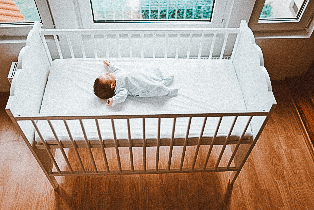Going Out to Dinner with Kids While on a Sleep Schedule
When Do Babies Sleep Through the Night?
When a baby sleeps through the night is dependent on a few factors: age, sleep habits, skill, and sleep science.
You may have heard that babies tend to sleep through the night around 5 or 6 months old. Developmentally, a baby’s circadian rhythm has regulated, and they are now on a more predictable flow between day and night. Also, at 5 months babies are eating solids in addition to breast milk and/or formula, and as a result are often not needing to wake to eat in the middle of the night. Further, by 6 months most babies are over 15 pounds, able to roll, and move freely. This allows babies to get into their most comfortable sleeping position, contributing to longer stretches of sleep.
Babies who are not sleeping longer stretches by now may have habits associated with sleep that have become the norm. Pacifier use, nursing, or rocking are habits in the bedtime routine that we have found can impact overnight sleep. This is not a judgment for families who wish to keep these things in their baby’s bedtime. This is an observation based on our experience with night wakings.
The Skill of Sleeping Through The Night
There are always some babies who get nursed and can sleep through the night, or “sleepier” babies that can fall asleep and stay asleep overnight, but often sleep skills must be taught. Our sleep training services analyze the potential cause for sleep disruptions, create new habits to support sleep, and guide a baby through the process.
The alternative to addressing habits impacting sleep after they have become routine, is to start creating healthy sleep habits from the start. The Newborn Sleep package provides weekly guidance to create habits that will lend itself to longer stretches of sleep once a baby is ready. As a result, we regularly see babies able to sleep through the night at 3 months of age.
The key to these skills, no matter the age, is an onset of sleep that can be replicated throughout the night by the baby.
How do sleep cycles affect a baby sleeping through the night?

Technically speaking, no one sleeps through the night. Human beings sleep in cycles, which vary from light to deep sleep and back again. During a light sleep cycle, you may hear a noise or shift positions, and that slight disruption is enough to wake. Adults experience this thousands of times in their lives and can easily go back to sleep. Most of us do not remember waking.
Unlike adults, some little ones are unable to transition between sleep cycles without the same circumstance in which they fell asleep being present. It is very challenging for a baby who falls asleep with help to learn to consistently sleep through the night without help.
How can I teach my baby to sleep through the night?
Your baby needs to fall asleep in a manner that can be repeated independently in order to sleep through the night. Routine and consistency are the cornerstones to learning new sleep skills. The routine ensures that baby is fed, with a clean diaper, and in comfortable pajamas. If you have established a part of the routine that involves you helping your baby fall asleep, you will need to create a routine in which your baby is able to go into his crib awake. If you love rocking your baby and want that to stay in your routine, that is okay! Consider moving it up in the routine so it is not the last thing that happens before sleep.
Your baby has likely known this routine for their whole life so learning to do things differently will take time, and your loving support. If you are working with an experienced consultant, the process of teaching a baby to sleep through the night will take a matter of days.
It is truly amazing to watch what babies are capable of.


